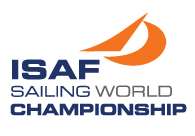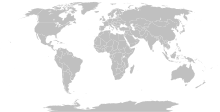Sailing World Championships
The Sailing World Championships (formerly ISAF Sailing World Championships) are World championships in sailing for the 10 events contested at the Summer Olympics, organized by World Sailing (formerly ISAF) and held every four years since 2003. In contrast to other years, when each class organise their World championship under supervision of World Sailing, they are the combined World championships for all the disciplines of the next Summer Olympics and serves as the major qualification event for it.
 | |
| First held | 2003 |
|---|---|
| Classes | 470, 49er, 49er FX, Finn, Laser, Laser Radial, Nacra 17, RS:X |
| Website | www |
History
The first ISAF Sailing World Championships was held in Cádiz in 2003, followed by Cascais in 2007 and Perth in 2011.[1]
In 2014, Santander hosted the 4th ISAF Sailing World Championships attracting more than 1,100 competitors, which distributed half of qualifications for the 2016 Summer Olympics sailing event.[1]
Editions
| Year | City | Country | Dates | Events | Athletes | Nations | Notes |
|---|---|---|---|---|---|---|---|
| 2003 | Cádiz | 11–24 September | 11 | 1,450 | 71 | [2] | |
| 2007 | Cascais | 28 June – 13 July | 11 | 1,350 | 76 | [3] | |
| 2011 | Perth | 3–18 December | 10 | 789 | 76 | [4] | |
| 2014 | Santander | 8–21 September | 10 | 1,250 | 83 | [5] | |
| 2018 | Aarhus | 30 July – 12 August | 12 | [6] | |||
| 2022 | The Hague |
Equipment
| Event | Class | Gender | Year | |||||||||||||||||||||||||||||||||||||||||||||||||
|---|---|---|---|---|---|---|---|---|---|---|---|---|---|---|---|---|---|---|---|---|---|---|---|---|---|---|---|---|---|---|---|---|---|---|---|---|---|---|---|---|---|---|---|---|---|---|---|---|---|---|---|---|
| 03 | 07 | 11 | 14 | 18 | 22 | |||||||||||||||||||||||||||||||||||||||||||||||
| One-person dinghies | Europe | W | ● | |||||||||||||||||||||||||||||||||||||||||||||||||
| Finn | M | ● | ● | ● | ● | |||||||||||||||||||||||||||||||||||||||||||||||
| O | ● | |||||||||||||||||||||||||||||||||||||||||||||||||||
| Laser | M | ● | ● | ● | ● | ● | ||||||||||||||||||||||||||||||||||||||||||||||
| O | ● | |||||||||||||||||||||||||||||||||||||||||||||||||||
| Laser Radial | W | ● | ● | ● | ● | ● | ||||||||||||||||||||||||||||||||||||||||||||||
| Two-person dinghies | 470 | M | ● | ● | ● | ● | ● | |||||||||||||||||||||||||||||||||||||||||||||
| W | ● | ● | ● | ● | ● | |||||||||||||||||||||||||||||||||||||||||||||||
| Mx | ● | |||||||||||||||||||||||||||||||||||||||||||||||||||
| 49er | M | ● | ● | ● | ● | |||||||||||||||||||||||||||||||||||||||||||||||
| O | ● | ● | ||||||||||||||||||||||||||||||||||||||||||||||||||
| 49er FX | W | ● | ● | ● | ||||||||||||||||||||||||||||||||||||||||||||||||
| Keelboats | Star | M | ● | ● | ● | |||||||||||||||||||||||||||||||||||||||||||||||
| Yngling | W | ● | ● | |||||||||||||||||||||||||||||||||||||||||||||||||
| Multihulls | Nacra 17 | Mx | ● | ● | ● | |||||||||||||||||||||||||||||||||||||||||||||||
| Tornado | O | ● | ● | |||||||||||||||||||||||||||||||||||||||||||||||||
| Boards | Formula Kite | M | Demo | |||||||||||||||||||||||||||||||||||||||||||||||||
| W | Demo | |||||||||||||||||||||||||||||||||||||||||||||||||||
| Mx | ● | |||||||||||||||||||||||||||||||||||||||||||||||||||
| Mistral | M | ● | ||||||||||||||||||||||||||||||||||||||||||||||||||
| W | ● | |||||||||||||||||||||||||||||||||||||||||||||||||||
| RS:X | M | ● | ● | ● | ● | |||||||||||||||||||||||||||||||||||||||||||||||
| W | ● | ● | ● | ● | ||||||||||||||||||||||||||||||||||||||||||||||||
| iFoil | M | ● | ||||||||||||||||||||||||||||||||||||||||||||||||||
| W | ● | |||||||||||||||||||||||||||||||||||||||||||||||||||
| Match racing | Elliott 6m | W | ● | |||||||||||||||||||||||||||||||||||||||||||||||||
| Yachting | tbc | ● | ||||||||||||||||||||||||||||||||||||||||||||||||||
| Total | 11 | 11 | 10 | 10 | 12 | |||||||||||||||||||||||||||||||||||||||||||||||
Legend: M – Men; W – Women; Mx – Mixed; O – Open;
All-time medal table
| Rank | Nation | Gold | Silver | Bronze | Total |
|---|---|---|---|---|---|
| 1 | 8 | 6 | 2 | 16 | |
| 2 | 7 | 4 | 5 | 16 | |
| 3 | 6 | 5 | 12 | 23 | |
| 4 | 6 | 5 | 6 | 17 | |
| 5 | 4 | 1 | 0 | 5 | |
| 6 | 3 | 3 | 3 | 9 | |
| 7 | 3 | 1 | 3 | 7 | |
| 8 | 2 | 4 | 0 | 6 | |
| 9 | 2 | 0 | 4 | 6 | |
| 10 | 2 | 0 | 1 | 3 | |
| 11 | 1 | 5 | 2 | 8 | |
| 12 | 1 | 2 | 1 | 4 | |
| 1 | 2 | 1 | 4 | ||
| 14 | 1 | 2 | 0 | 3 | |
| 15 | 1 | 1 | 1 | 3 | |
| 16 | 1 | 1 | 0 | 2 | |
| 1 | 1 | 0 | 2 | ||
| 18 | 1 | 0 | 0 | 1 | |
| 1 | 0 | 0 | 1 | ||
| 1 | 0 | 0 | 1 | ||
| 1 | 0 | 0 | 1 | ||
| 22 | 0 | 3 | 0 | 3 | |
| 23 | 0 | 2 | 3 | 5 | |
| 0 | 2 | 3 | 5 | ||
| 25 | 0 | 2 | 0 | 2 | |
| 26 | 0 | 1 | 2 | 3 | |
| 27 | 0 | 1 | 1 | 2 | |
| 28 | 0 | 0 | 1 | 1 | |
| 0 | 0 | 1 | 1 | ||
| 0 | 0 | 1 | 1 | ||
| 0 | 0 | 1 | 1 | ||
| Totals (31 nations) | 54 | 54 | 54 | 162 | |
See also
References
- "Background". sailing.org.
- "ISAF Sailing World Championships 2003". sailing.org.
- "ISAF Sailing World Championships 2007". sailing.org.
- "Perth 2011 ISAF Sailing World Championships". sailing.org.
- "2014 ISAF Sailing World Championships". sailing.org.
- "Hempel Sailing World Championships Aarhus 2018". sailing.org.
.svg.png)
